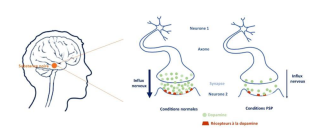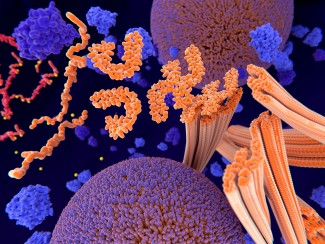The causes of progressive supranuclear palsy (PSP) are still unknown. This condition is considered multifactorial, with a probable genetic predisposition coupled with an environmental factor. It is not a hereditary disease, and the genetic component is very likely based on several genetic variants that have not yet been identified. One hypothesis that has been studied is a toxic environmental origin, such as exposure to arsenic or chromium in the textile industry, but this has never been formally proven.
Biological Mechanisms of PSP
In biological terms, there are malfunctions in the transmission of information between neurons due to a deficit in neurotransmitters, molecules that enable the transmission of nerve impulses between pairs of neurons and are released in synapses.

The most significant deficit observed in 90% of patients concerns dopamine and its receptors in the substantia nigra. In approximately 40% of patients, tests have shown a decrease in the effect of acetylcholine, another neurotransmitter, particularly in the basal ganglia, the pallidum, and the brain stem.
At Paris Brain Institute
Dr Isabelle Le Ber, neurologist, Coordinator of the Reference Center for Progressive Supranuclear Palsy at Pitié-Salpêtrière Hospital and researcher on the team led by Alexandra Durr and Giovanni Stevanin, is seeking to identify the causes and better understand the mechanisms of the disease.

